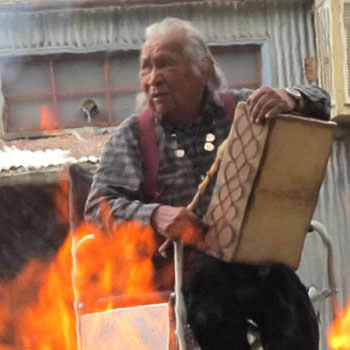Storytellers Charlie Thom (pictured here) and Clarence Hostler, visual artists Debora Iyall, Brian Tripp, I Made Moja, and Tim Lee Smith, folklorist Deborah Bruce and puppeteers and designers of ShadowLight Productions–directed by ShadowLight Productions‘ artistic director Larry Reed—created two shadow plays for family audiences based on California Native American stories.
The content and partnerships for this piece changed after the grant was awarded. Originally proposed and funded as “Sutter’s Gold,” the Sesquicentennial work was going to explore social conflicts set in motion by the California Gold Rush. Richard Marriott was to compose and conduct an original score. However, as they began exploring the state’s story, members of ShadowLight Productions felt the need to step back and examine California prior to European occupation.
The production began with a Hupa story that had been passed down to Clarence Hostler by his grandmother. “Skatsaree” describes a man’s spiritual quest and the lessons the world offers him about responsibility and balance. The second piece, “The Salmon Sisters” was based on a Karuk story contributed by visual artist and musician Brian Tripp and narrated by Karuk elder Charlie Red Hawk Thom. The production featured Balinese shadow theater accompanied by live music and actors.
Artistic director Larry Reed founded Shadow Play Theater Company in 1972, and ShadowLight Productions was incorporated as a nonprofit in early 1995. The company is an ensemble of creative artists from diverse cultural backgrounds who explore the theatrical use of shadows. Richard Marriott studied with Pauline Oliveros, Dominick Argento, Ali Akbar Kahn, and Masayuki Koga; designed synthesizers with Serge Tchrepnin; and recorded with The Residents before forming San Francisco’s Club Foot Orchestra in 1983 as a vehicle for his compositions.

